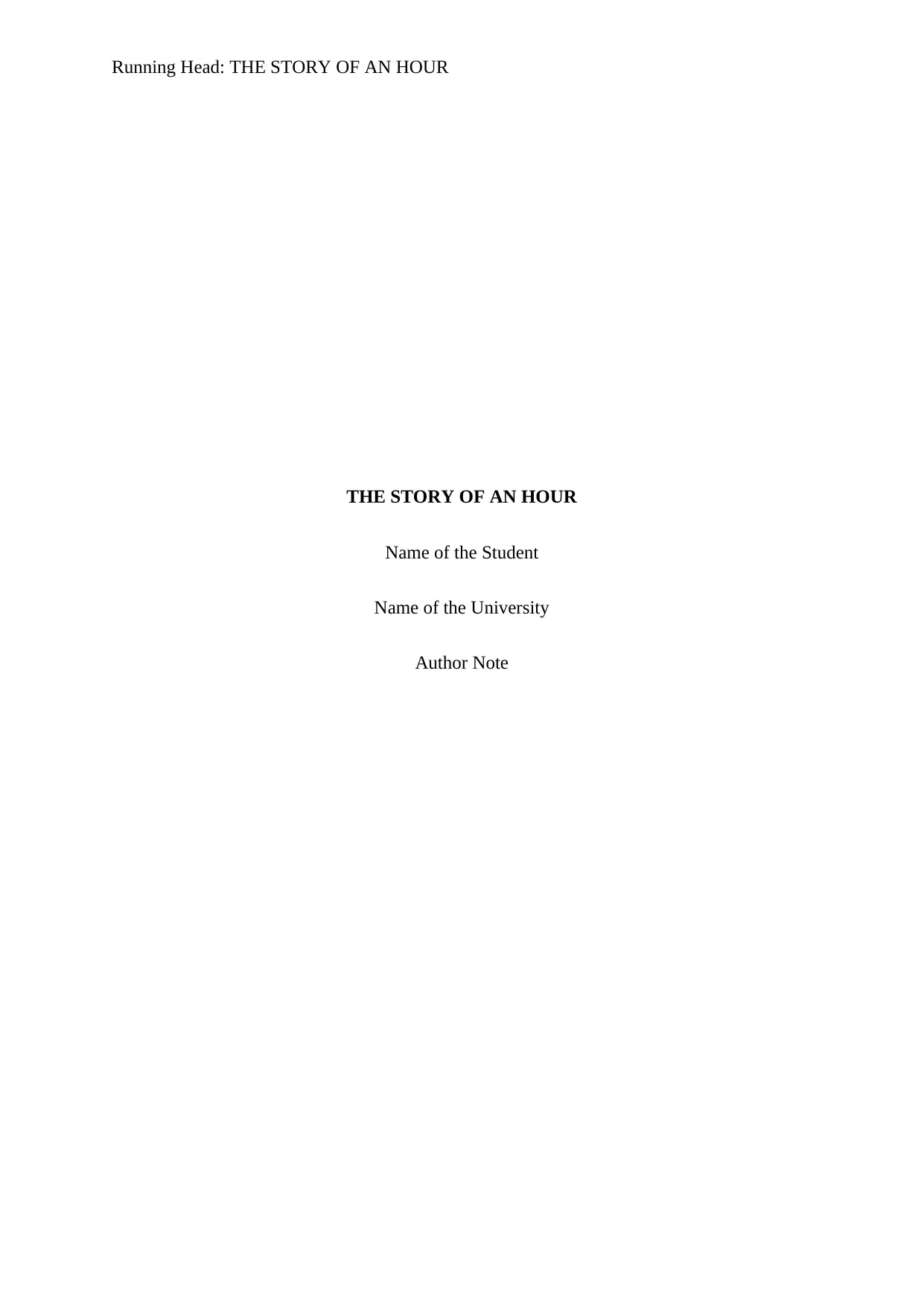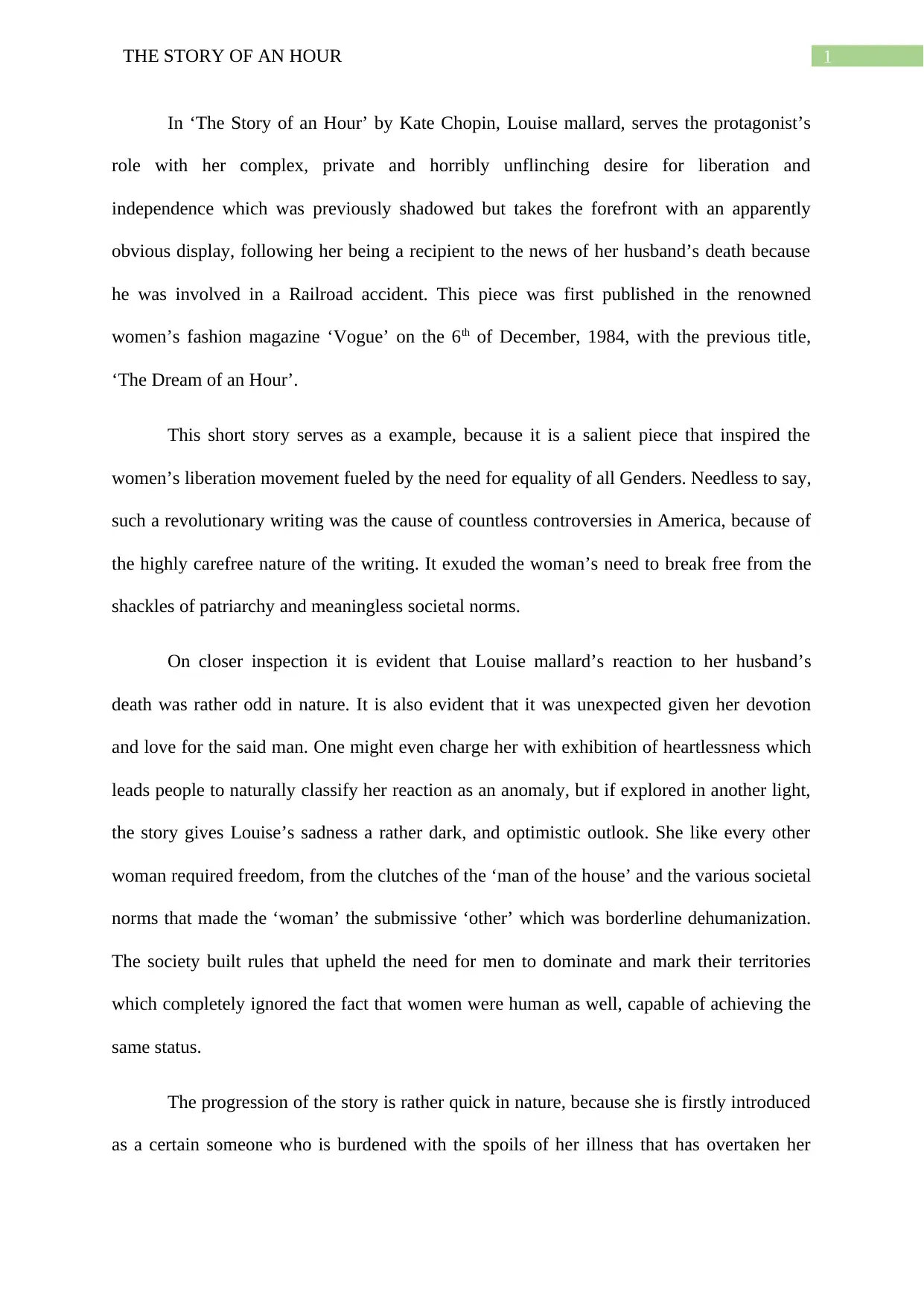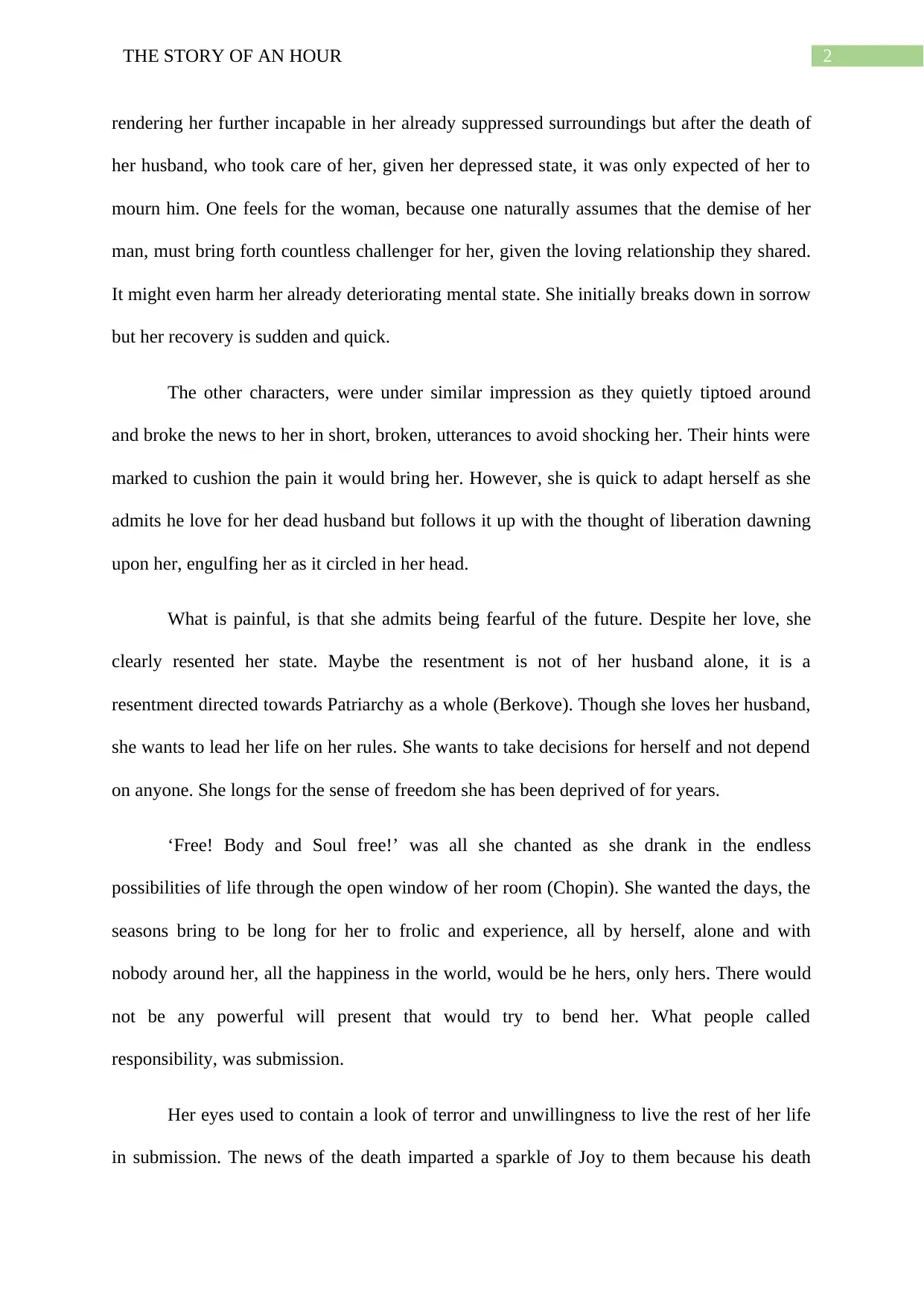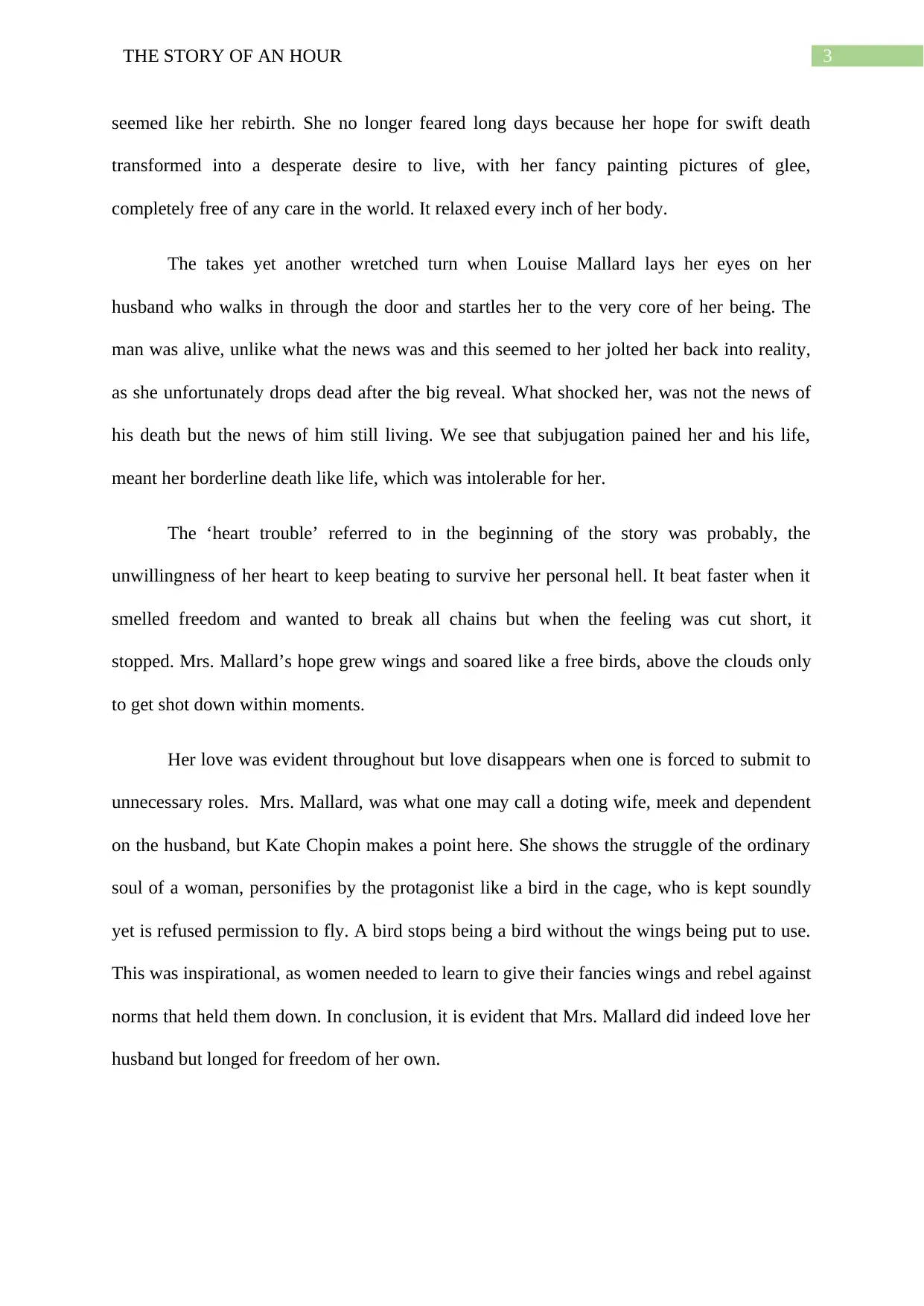ENGL 100 Essay: Analysis of 'The Story of an Hour' by Chopin
VerifiedAdded on 2023/04/04
|5
|1094
|324
Essay
AI Summary
This essay offers an in-depth analysis of Kate Chopin's 'The Story of an Hour,' focusing on the protagonist Louise Mallard's complex reaction to her husband's supposed death and her yearning for freedom from societal constraints. The essay explores themes of liberation, confinement, and the oppressive nature of patriarchal norms prevalent during the time the story was written. It examines Louise's initial grief, followed by her sudden realization of the possibilities for independence, and the ultimate tragic twist when her husband returns, leading to her death. The analysis highlights Chopin's critique of marriage and the limited roles available to women, portraying Louise's desire for autonomy as a powerful, yet ultimately unattainable, aspiration. The essay references critical perspectives to support its interpretation of Louise's internal conflict and the story's broader commentary on gender and societal expectations. It concludes that Mrs. Mallard, while loving, longed for her own freedom.

Running Head: THE STORY OF AN HOUR
THE STORY OF AN HOUR
Name of the Student
Name of the University
Author Note
THE STORY OF AN HOUR
Name of the Student
Name of the University
Author Note
Paraphrase This Document
Need a fresh take? Get an instant paraphrase of this document with our AI Paraphraser

1THE STORY OF AN HOUR
In ‘The Story of an Hour’ by Kate Chopin, Louise mallard, serves the protagonist’s
role with her complex, private and horribly unflinching desire for liberation and
independence which was previously shadowed but takes the forefront with an apparently
obvious display, following her being a recipient to the news of her husband’s death because
he was involved in a Railroad accident. This piece was first published in the renowned
women’s fashion magazine ‘Vogue’ on the 6th of December, 1984, with the previous title,
‘The Dream of an Hour’.
This short story serves as a example, because it is a salient piece that inspired the
women’s liberation movement fueled by the need for equality of all Genders. Needless to say,
such a revolutionary writing was the cause of countless controversies in America, because of
the highly carefree nature of the writing. It exuded the woman’s need to break free from the
shackles of patriarchy and meaningless societal norms.
On closer inspection it is evident that Louise mallard’s reaction to her husband’s
death was rather odd in nature. It is also evident that it was unexpected given her devotion
and love for the said man. One might even charge her with exhibition of heartlessness which
leads people to naturally classify her reaction as an anomaly, but if explored in another light,
the story gives Louise’s sadness a rather dark, and optimistic outlook. She like every other
woman required freedom, from the clutches of the ‘man of the house’ and the various societal
norms that made the ‘woman’ the submissive ‘other’ which was borderline dehumanization.
The society built rules that upheld the need for men to dominate and mark their territories
which completely ignored the fact that women were human as well, capable of achieving the
same status.
The progression of the story is rather quick in nature, because she is firstly introduced
as a certain someone who is burdened with the spoils of her illness that has overtaken her
In ‘The Story of an Hour’ by Kate Chopin, Louise mallard, serves the protagonist’s
role with her complex, private and horribly unflinching desire for liberation and
independence which was previously shadowed but takes the forefront with an apparently
obvious display, following her being a recipient to the news of her husband’s death because
he was involved in a Railroad accident. This piece was first published in the renowned
women’s fashion magazine ‘Vogue’ on the 6th of December, 1984, with the previous title,
‘The Dream of an Hour’.
This short story serves as a example, because it is a salient piece that inspired the
women’s liberation movement fueled by the need for equality of all Genders. Needless to say,
such a revolutionary writing was the cause of countless controversies in America, because of
the highly carefree nature of the writing. It exuded the woman’s need to break free from the
shackles of patriarchy and meaningless societal norms.
On closer inspection it is evident that Louise mallard’s reaction to her husband’s
death was rather odd in nature. It is also evident that it was unexpected given her devotion
and love for the said man. One might even charge her with exhibition of heartlessness which
leads people to naturally classify her reaction as an anomaly, but if explored in another light,
the story gives Louise’s sadness a rather dark, and optimistic outlook. She like every other
woman required freedom, from the clutches of the ‘man of the house’ and the various societal
norms that made the ‘woman’ the submissive ‘other’ which was borderline dehumanization.
The society built rules that upheld the need for men to dominate and mark their territories
which completely ignored the fact that women were human as well, capable of achieving the
same status.
The progression of the story is rather quick in nature, because she is firstly introduced
as a certain someone who is burdened with the spoils of her illness that has overtaken her

2THE STORY OF AN HOUR
rendering her further incapable in her already suppressed surroundings but after the death of
her husband, who took care of her, given her depressed state, it was only expected of her to
mourn him. One feels for the woman, because one naturally assumes that the demise of her
man, must bring forth countless challenger for her, given the loving relationship they shared.
It might even harm her already deteriorating mental state. She initially breaks down in sorrow
but her recovery is sudden and quick.
The other characters, were under similar impression as they quietly tiptoed around
and broke the news to her in short, broken, utterances to avoid shocking her. Their hints were
marked to cushion the pain it would bring her. However, she is quick to adapt herself as she
admits he love for her dead husband but follows it up with the thought of liberation dawning
upon her, engulfing her as it circled in her head.
What is painful, is that she admits being fearful of the future. Despite her love, she
clearly resented her state. Maybe the resentment is not of her husband alone, it is a
resentment directed towards Patriarchy as a whole (Berkove). Though she loves her husband,
she wants to lead her life on her rules. She wants to take decisions for herself and not depend
on anyone. She longs for the sense of freedom she has been deprived of for years.
‘Free! Body and Soul free!’ was all she chanted as she drank in the endless
possibilities of life through the open window of her room (Chopin). She wanted the days, the
seasons bring to be long for her to frolic and experience, all by herself, alone and with
nobody around her, all the happiness in the world, would be he hers, only hers. There would
not be any powerful will present that would try to bend her. What people called
responsibility, was submission.
Her eyes used to contain a look of terror and unwillingness to live the rest of her life
in submission. The news of the death imparted a sparkle of Joy to them because his death
rendering her further incapable in her already suppressed surroundings but after the death of
her husband, who took care of her, given her depressed state, it was only expected of her to
mourn him. One feels for the woman, because one naturally assumes that the demise of her
man, must bring forth countless challenger for her, given the loving relationship they shared.
It might even harm her already deteriorating mental state. She initially breaks down in sorrow
but her recovery is sudden and quick.
The other characters, were under similar impression as they quietly tiptoed around
and broke the news to her in short, broken, utterances to avoid shocking her. Their hints were
marked to cushion the pain it would bring her. However, she is quick to adapt herself as she
admits he love for her dead husband but follows it up with the thought of liberation dawning
upon her, engulfing her as it circled in her head.
What is painful, is that she admits being fearful of the future. Despite her love, she
clearly resented her state. Maybe the resentment is not of her husband alone, it is a
resentment directed towards Patriarchy as a whole (Berkove). Though she loves her husband,
she wants to lead her life on her rules. She wants to take decisions for herself and not depend
on anyone. She longs for the sense of freedom she has been deprived of for years.
‘Free! Body and Soul free!’ was all she chanted as she drank in the endless
possibilities of life through the open window of her room (Chopin). She wanted the days, the
seasons bring to be long for her to frolic and experience, all by herself, alone and with
nobody around her, all the happiness in the world, would be he hers, only hers. There would
not be any powerful will present that would try to bend her. What people called
responsibility, was submission.
Her eyes used to contain a look of terror and unwillingness to live the rest of her life
in submission. The news of the death imparted a sparkle of Joy to them because his death
⊘ This is a preview!⊘
Do you want full access?
Subscribe today to unlock all pages.

Trusted by 1+ million students worldwide

3THE STORY OF AN HOUR
seemed like her rebirth. She no longer feared long days because her hope for swift death
transformed into a desperate desire to live, with her fancy painting pictures of glee,
completely free of any care in the world. It relaxed every inch of her body.
The takes yet another wretched turn when Louise Mallard lays her eyes on her
husband who walks in through the door and startles her to the very core of her being. The
man was alive, unlike what the news was and this seemed to her jolted her back into reality,
as she unfortunately drops dead after the big reveal. What shocked her, was not the news of
his death but the news of him still living. We see that subjugation pained her and his life,
meant her borderline death like life, which was intolerable for her.
The ‘heart trouble’ referred to in the beginning of the story was probably, the
unwillingness of her heart to keep beating to survive her personal hell. It beat faster when it
smelled freedom and wanted to break all chains but when the feeling was cut short, it
stopped. Mrs. Mallard’s hope grew wings and soared like a free birds, above the clouds only
to get shot down within moments.
Her love was evident throughout but love disappears when one is forced to submit to
unnecessary roles. Mrs. Mallard, was what one may call a doting wife, meek and dependent
on the husband, but Kate Chopin makes a point here. She shows the struggle of the ordinary
soul of a woman, personifies by the protagonist like a bird in the cage, who is kept soundly
yet is refused permission to fly. A bird stops being a bird without the wings being put to use.
This was inspirational, as women needed to learn to give their fancies wings and rebel against
norms that held them down. In conclusion, it is evident that Mrs. Mallard did indeed love her
husband but longed for freedom of her own.
seemed like her rebirth. She no longer feared long days because her hope for swift death
transformed into a desperate desire to live, with her fancy painting pictures of glee,
completely free of any care in the world. It relaxed every inch of her body.
The takes yet another wretched turn when Louise Mallard lays her eyes on her
husband who walks in through the door and startles her to the very core of her being. The
man was alive, unlike what the news was and this seemed to her jolted her back into reality,
as she unfortunately drops dead after the big reveal. What shocked her, was not the news of
his death but the news of him still living. We see that subjugation pained her and his life,
meant her borderline death like life, which was intolerable for her.
The ‘heart trouble’ referred to in the beginning of the story was probably, the
unwillingness of her heart to keep beating to survive her personal hell. It beat faster when it
smelled freedom and wanted to break all chains but when the feeling was cut short, it
stopped. Mrs. Mallard’s hope grew wings and soared like a free birds, above the clouds only
to get shot down within moments.
Her love was evident throughout but love disappears when one is forced to submit to
unnecessary roles. Mrs. Mallard, was what one may call a doting wife, meek and dependent
on the husband, but Kate Chopin makes a point here. She shows the struggle of the ordinary
soul of a woman, personifies by the protagonist like a bird in the cage, who is kept soundly
yet is refused permission to fly. A bird stops being a bird without the wings being put to use.
This was inspirational, as women needed to learn to give their fancies wings and rebel against
norms that held them down. In conclusion, it is evident that Mrs. Mallard did indeed love her
husband but longed for freedom of her own.
Paraphrase This Document
Need a fresh take? Get an instant paraphrase of this document with our AI Paraphraser

4THE STORY OF AN HOUR
References
Berkove, Lawrence I. "Fatal Self-Assertion in Kate Chopin's" The Story of an
Hour"." American Literary Realism 32.2 (2000): 152-158.
Chopin, Kate. The story of an hour. Jimcin Recordings, 1981.
References
Berkove, Lawrence I. "Fatal Self-Assertion in Kate Chopin's" The Story of an
Hour"." American Literary Realism 32.2 (2000): 152-158.
Chopin, Kate. The story of an hour. Jimcin Recordings, 1981.
1 out of 5
Related Documents
Your All-in-One AI-Powered Toolkit for Academic Success.
+13062052269
info@desklib.com
Available 24*7 on WhatsApp / Email
![[object Object]](/_next/static/media/star-bottom.7253800d.svg)
Unlock your academic potential
Copyright © 2020–2026 A2Z Services. All Rights Reserved. Developed and managed by ZUCOL.





